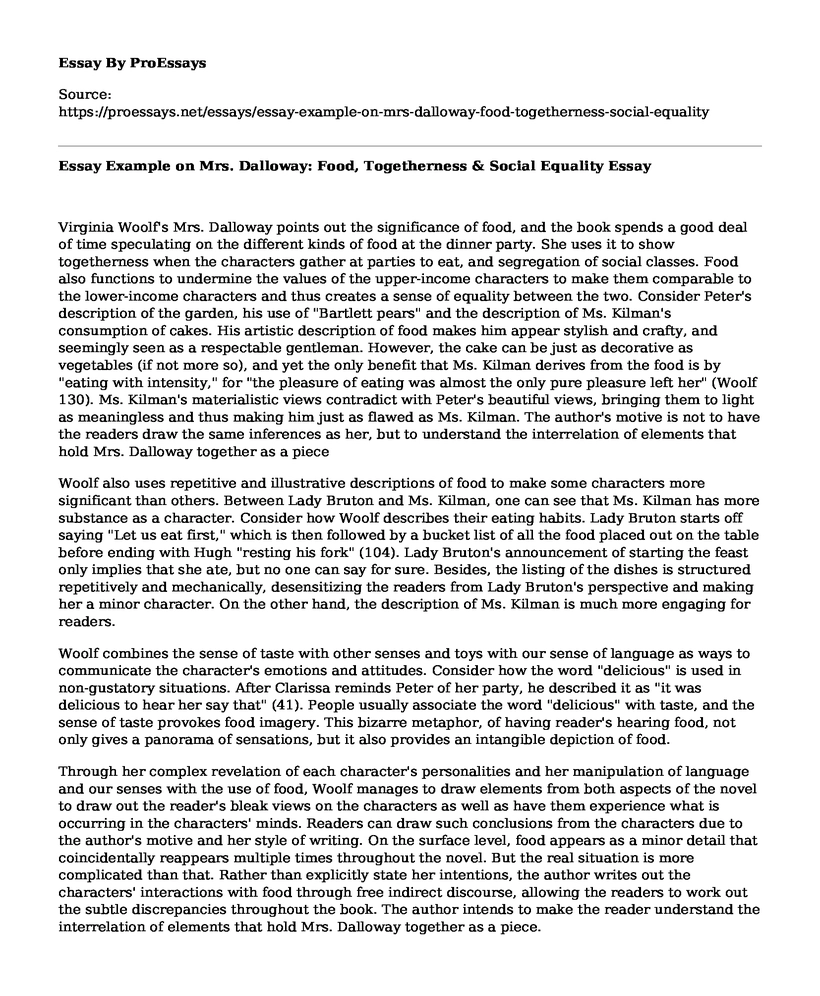Virginia Woolf's Mrs. Dalloway points out the significance of food, and the book spends a good deal of time speculating on the different kinds of food at the dinner party. She uses it to show togetherness when the characters gather at parties to eat, and segregation of social classes. Food also functions to undermine the values of the upper-income characters to make them comparable to the lower-income characters and thus creates a sense of equality between the two. Consider Peter's description of the garden, his use of "Bartlett pears" and the description of Ms. Kilman's consumption of cakes. His artistic description of food makes him appear stylish and crafty, and seemingly seen as a respectable gentleman. However, the cake can be just as decorative as vegetables (if not more so), and yet the only benefit that Ms. Kilman derives from the food is by "eating with intensity," for "the pleasure of eating was almost the only pure pleasure left her" (Woolf 130). Ms. Kilman's materialistic views contradict with Peter's beautiful views, bringing them to light as meaningless and thus making him just as flawed as Ms. Kilman. The author's motive is not to have the readers draw the same inferences as her, but to understand the interrelation of elements that hold Mrs. Dalloway together as a piece
Woolf also uses repetitive and illustrative descriptions of food to make some characters more significant than others. Between Lady Bruton and Ms. Kilman, one can see that Ms. Kilman has more substance as a character. Consider how Woolf describes their eating habits. Lady Bruton starts off saying "Let us eat first," which is then followed by a bucket list of all the food placed out on the table before ending with Hugh "resting his fork" (104). Lady Bruton's announcement of starting the feast only implies that she ate, but no one can say for sure. Besides, the listing of the dishes is structured repetitively and mechanically, desensitizing the readers from Lady Bruton's perspective and making her a minor character. On the other hand, the description of Ms. Kilman is much more engaging for readers.
Woolf combines the sense of taste with other senses and toys with our sense of language as ways to communicate the character's emotions and attitudes. Consider how the word "delicious" is used in non-gustatory situations. After Clarissa reminds Peter of her party, he described it as "it was delicious to hear her say that" (41). People usually associate the word "delicious" with taste, and the sense of taste provokes food imagery. This bizarre metaphor, of having reader's hearing food, not only gives a panorama of sensations, but it also provides an intangible depiction of food.
Through her complex revelation of each character's personalities and her manipulation of language and our senses with the use of food, Woolf manages to draw elements from both aspects of the novel to draw out the reader's bleak views on the characters as well as have them experience what is occurring in the characters' minds. Readers can draw such conclusions from the characters due to the author's motive and her style of writing. On the surface level, food appears as a minor detail that coincidentally reappears multiple times throughout the novel. But the real situation is more complicated than that. Rather than explicitly state her intentions, the author writes out the characters' interactions with food through free indirect discourse, allowing the readers to work out the subtle discrepancies throughout the book. The author intends to make the reader understand the interrelation of elements that hold Mrs. Dalloway together as a piece.
Works Cited
Woolf, Virginia, and C A. Jordana. Mrs. Dalloway. Barcelona: Proa, 2003. Print.
Cite this page
Essay Example on Mrs. Dalloway: Food, Togetherness & Social Equality. (2023, Jan 13). Retrieved from https://proessays.net/essays/essay-example-on-mrs-dalloway-food-togetherness-social-equality
If you are the original author of this essay and no longer wish to have it published on the ProEssays website, please click below to request its removal:
- Characters Edgar Allen Poe Reveals in His Literary Work
- Critical Essay on Killer Angels by Michael Shaara
- Analysis of Sappho's Poem 94 Essay Example
- The Extent to which Family Law Recognizes Children's Rights - Essay Sample
- Paper Example on 4 Rational Selling Premises for Strategic Communications
- Essay Sample on Antonio's Loyalty: Facing Challenges to Help a Friend
- Essay Sample on Gaining Investors: Effective Communication for Success







